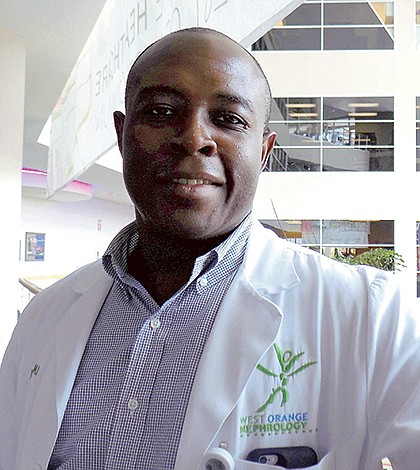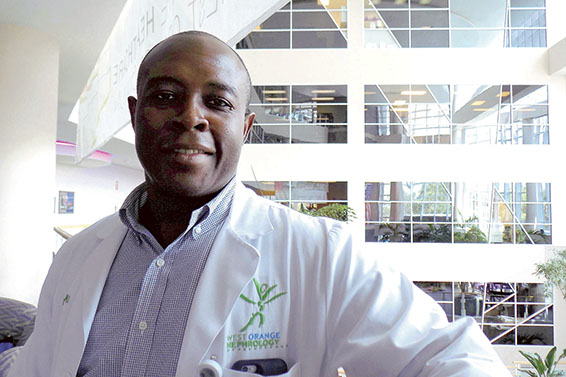- October 21, 2024
-
-
Loading

Loading


The kidneys tend to be ignored until later in life, when they start to become troublesome. But Dr. Banji Awosika of West Orange Nephrology has been seeing younger and younger patients with kidney problems.
The reason, he says, is his patients are not taking care of their bodies as a whole.
“Kidney disease is usually a sign of the cumulative effects of these chronic diseases: blood pressure, diabetes, high cholesterol,” Awosika says. “When you have these diseases for a while, you develop kidney disease.”
Awosika’s main goal is to help his patients get off the medications they take for non-kidney issues. He would rather impact the source of the kidney problem, which is often found elsewhere in the body, than prescribe another medication.
The kidneys are filters for the body and excrete urine, so hydration is an important part of keeping kidneys healthy. But because the entire body’s health affects the kidneys, Awosika stresses the importance of four other areas of life: diet, exercise, rest and relationship.
Awosika views the body like a bank account. Fruits, vegetables and legumes are “deposits” — they increase the body’s reserve. Exercise works the same way. But meats, eggs and other animal products — even sometimes fish, which many of Awosika’s patients think is a healthy food — act as “withdrawals.” Awosika and his family eat meat only one or two times each week.
If you are withdrawing more than your deposits, you are likely to encounter a problem.
As for rest, Awosika says seven unfragmented hours each night is sufficient. And healthy relationships are important for mental health: spouses, children and good friends.
Awosika is Nigerian, but his father was a diplomat, so the family also lived in Egypt, Japan and the United Kingdom throughout Awosika’s childhood. After medical school in Nigeria, Awosika worked as a physician in Trinidad and Tobago and as a psychiatrist in the United Kingdom. He moved to the United States in 1994 and has worked in West Orange County for 11 years.
Awosika was attracted to nephrology because of personal interest.
“Hypertension is very strong in my family, and as a kidney specialist, you also become a blood pressure specialist,” he says.
His father and seven uncles all had hypertension, and five have died from a stroke or heart attack.
West Orange Nephrology had been located within Health Central Hospital since 2007 but moved its main office last week to 1210 E. Plant Street, Winter Garden.
For more information, visit westorangenephrology.com.
THE BIG FOUR
There are a few diseases that Dr. Banji Awosika refers to as the “Big Four” — high blood pressure, diabetes, high cholesterol and gout. These ailments are often the ultimate cause of kidney problems. Awosika helps his patients make lifestyle changes that will get them off their medications for these diseases.
“If I’m able to reverse the processes that have led to this disease in the first place, the evidence of that is they require less and less medication,” he says.
FIVE TIPS FOR KIDNEY HEALTH
1. Learn. “The biggest thing for me is education,” Awosika says. “I believe that when you know better, you tend to do better.”
2. Screen. At about age 30, everyone should start having annual screenings for kidney disease. Anyone with a family history of kidney disease or the “Big Four” should start around age 18 and continue to be tested every six months.
3. Hydrate. As a rule of thumb, Awosika recommends one ounce of water per kilogram of body weight per day.
4. Adjust. As filters of the body, kidneys depend on a healthy diet to work properly. Fruits and vegetables are key, and meat should be consumed in moderation, Awoka says.
5. Exercise. Awosika recommends 45 minutes of exercise, six days a week. Anyone over age 40 should particularly try to adhere to this regimen to counteract the body’s natural tendency to decay.
WHAT ARE KIDNEY STONES?
When salts and minerals in the urine stick together, a kidney stone forms. Kidney stones can be as small as grains of sand, up to as large as golf balls. And they can cause varying levels of pain.
The most common cause of kidney stones is a deficiency of water intake. To avoid kidney stones, try to drink enough water so that your urine is clear.
Symptoms include persistent pain in your back or side; blood in your urine; fever and chills; vomiting; urine that smells bad or looks cloudy; and a burning feeling during urination.